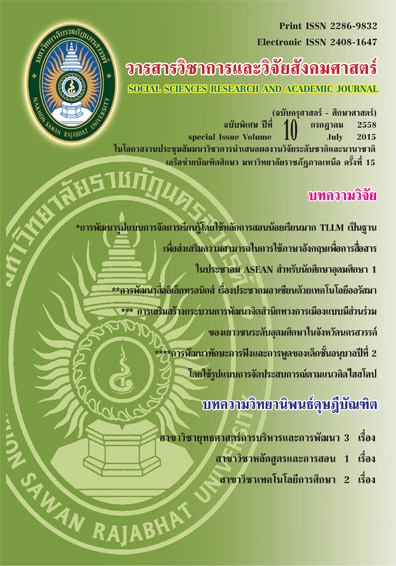การเสริมสร้างกระบวนการพัฒนาจิตสำนึกทางการเมืองแบบมีส่วนร่วมของเยาวชนระดับอุดมศึกษา ในจังหวัดนครสวรรค์; The Reinforcement of Political Consciousness in the Participation of Youth in Higher Education in NakhonSawan Province
Main Article Content
Abstract
บทคัดย่อ
การวิจัยครั้งนี้มีวัตถุประสงค์ 1) เพื่อศึกษาระดับจิตสำนึกทางการเมืองและปัจจัยที่มีอิทธิผลต่อจิตสำนึกทางการเมืองแบบมีส่วนร่วมของเยาวชน 2) ศึกษาสภาพปัญหา อุปสรรคของการพัฒนาจิตสำนึกทางการเมืองแบบมีส่วนร่วมของเยาวชน 3) นำเสนอแนวทางเสริมสร้างกระบวนการพัฒนาจิตสำนึกทางการเมืองแบบมีส่วนร่วมของเยาวชนระดับอุดมศึกษาในจังหวัดนครสวรรค์ ผู้ให้ข้อมูลหลัก ได้แก่ ตัวแทนผู้บริหาร คณาจารย์ นักศึกษาในสถาบันอุดมศึกษาและเจ้าหน้าที่ของรัฐที่เกี่ยวข้อง ในจังหวัดนครสวรรค์ วิเคราะห์ข้อมูลโดยหาค่าเฉลี่ย ค่าส่วนเบี่ยงเบนมาตรฐาน ค่าพหุคูณแบบถดถอย และข้อมูลเชิงคุณภาพใช้การวิเคราะห์แบบอุปนัย
ผลการวิจัยพบว่า 1. ระดับจิตสำนึกทางการเมืองแบบมีส่วนร่วม ในภาพรวมอยู่ระดับปานกลาง (= 3.10) โดยปัจจัยที่มีอิทธิพลต่อจิตสำนึกทางการเมืองแบบมีส่วนร่วม ได้แก่ การกล่อมเกลาจากสถาบันทางสังคม (t= 2.039) การเกื้อหนุนทางเศรษฐกิจ (t = 2.413) การรับรู้ข้อมูลข่าวสารและสื่อเทคโนโลยี (t = 2.697) และความรู้เรื่องสิทธิและเสรีภาพทางการเมือง (t = 2.878) และทุกด้านมีความสัมพันธ์ในเชิงบวกกับจิตสำนึกทางการเมืองแบบมีส่วนร่วม
2. ปัญหา อุปสรรคในการพัฒนาจิตสำนึกทางการเมืองแบบมีส่วนร่วมได้แก่ กระบวนการจัดการเรียนการสอน ขาดผู้นำและแนวร่วมนักศึกษา ขาดการสนับสนุนจากครอบครัว ขาดงบประมาณสนับสนุน ขาดการสร้างประวัติศาสตร์ทางการเมืองในพื้นที่ร่วมกัน ขาดการประชาสัมพันธ์ข่าวสารทางการเมือง นักศึกษาบางส่วนมีทัศนคติเชิงลบต่อการเมือง และมีความรู้การเมืองน้อย
3. แนวทางการเสริมสร้างกระบวนการพัฒนาจิตสำนึกทางการเมืองแบบมีส่วนร่วมของเยาวชนระดับอุดมศึกษา ได้แก่ 1) พัฒนาทักษะความรู้ 2) ประสานความร่วมมือจากสถาบันทางสังคมตามหลักบวร 3) พัฒนาช่องทางในการใช้สื่อเทคโนโลยี 4) การสร้างแนวทางจูงใจ หรือผลประโยชน์ตอบแทน 5) ผลักดันการทำกิจกรรมทางการเมืองอย่างต่อเนื่อง 6) จัดตั้งกลุ่มและเครือข่ายความร่วมมือ 7) การสร้างต้นแบบทางการเมือง 8) สร้างประวัติศาสตร์ทางการเมืองในพื้นที่ร่วมกัน 9) สร้างมาตรการทางกฎ ข้อบังคับในการมีส่วนร่วม
Abstract
The objectives of this study were: 1) to study level and the influenced factors of the political consciousness in the participation of youth. 2) to study problems and obstacles of the political consciousness in the participation of youth. 3) to present the courses of the reinforcement of the political consciousness in the participation of youth in Higher Education in NakhonSawan Province. The key informants in qualitative were administrators and professors in the Higher Education and officials in NakhonSawan Province. The data analysis were mean, standard deviation, pearson correlation coefficient and multiple regression.
The findings were as follows: 1. The level of the political consciousness in the participation of youth in higher education in overall is an average (=3.10). The influenced factors of the political consciousness in the participation are the institutional socialization (t=2.039), the economic support (t=2.413), the information and technology perception (t=2.697) and the knowledge of political right and freedom (t=2.878). 2. The problems and obstacles of the political consciousness in the participation are the inefficiency of educational process, lack of the student leader and allies to participate the political activities, lack of students’ family to support, lack of budget to support, lack of building the political history in locality, lack of political information heads up in the university, the negative attitudes of some professors and students, lack of competence of students to distinguish the facts in the political news and lack of political right acknowledge of students 3. The courses of the reinforcement of political consciousness in the participation of youth in higher education are 1) to encourage the development of knowledge. 2) to encourage the cooperation with social institution. 3) to develop the channels of political communication through technology. 4) to motivate the political interest in various patterns. 5) to encourage the political activities continually. 6) to encourage to group or build the political network. 7) to have the good political model. 8) to build the political history in the locality and 9) to regulate the rules in the participant.


